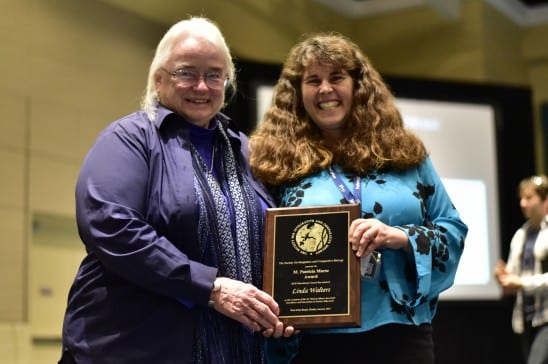Biology Professor Earns Top Honors
 From creating storybooks that teach preschoolers about the dangers of aquarium dumping to engaging more than 47,000 volunteers on oyster-reef restoration and living-shoreline projects since 2007, UCF biology professor Linda Walters has found ways to make science exciting and relevant to people of all ages.
From creating storybooks that teach preschoolers about the dangers of aquarium dumping to engaging more than 47,000 volunteers on oyster-reef restoration and living-shoreline projects since 2007, UCF biology professor Linda Walters has found ways to make science exciting and relevant to people of all ages.
That’s why earlier this month the Society for Integrative and Comparative Biology (SICB)awarded her the M. Patricia Morse Award for Excellence and Innovation in Science Education.
Walters, a longtime biology professor and director of the UCF Center for Success of Women Faculty, received her award in front of more than 1,800 members of the SICB during its annual conference in South Florida. Among those watching was her longtime mentor M. Patricia Morse. Walters is only the second recipient of the award.
“I’m honored and humbled, especially given my strong admiration for Dr. Morse’s accomplishments,” Walters said. “Dr. Morse was one of my first mentors and role models as an undergraduate and then graduate student. She demonstrated to me that both science and education were important and should be woven together to make an impact.”
Marine biologist and educator Morse has made significant contributions to science education as a professor at Northeastern University and University of Washington. She also served four years as a program director at the National Science Foundation in the Division of Elementary, Secondary and Informal Education, as a specialist in biology and environmental science in instructional materials development. Morse also chaired the National Research Council Committee on Attracting Science and Mathematics Ph.Ds to K-12 Education. She served as president of the SICB in 1985.
Walters was recognized for her impact and significant achievements in science education both inside and outside the classroom. Her classroom innovations focus on finding ways to engage students that both challenge and prepare them for their future careers. For example, in her upper-division marine biology class, field-research experiences are integrated with science communication training and service-learning.
She has mentored numerous graduate students, worked one-on-one with undergraduates and many others from the College of Education and Professional Science Master’s degree program. Walters also works directly with colleagues to share teaching ideas and collaborates with campus wide faculty to integrate research into large courses that traditionally lack such experiences. Moreover, she is no stranger to engaging the community in her research efforts. Each year, she runs workshops for K-12 educators, visits countless classrooms with her students, shares information at environmental festivals and speaks at many events on estuarine conservation and restoration, all while continuing her research in the field.
Perhaps the biggest educational impact she’s had is a byproduct of her marine conservation work and her collaborative style. Walters, her students and K-12 teachers have collaborated over the years to create a range of products that compliment Walters’ research and help educate the broader community.
These include: storybooks for preschoolers about the dangers of aquarium dumping, activity books on sea level rise impacts on flora and fauna, animated movies, and even a phone app (REEL Florida) that promotes ecologically responsible boating in Mosquito Lagoon, among many others.
Her efforts and those of her team have garnered many awards, including a 2014 Disney Hero of Conservation award, a 2014 American Association of Zoos and Aquariums Conservation award and a host of others.
Colleagues from the fields of biology and education as well as the Brevard Zoo nominated Walters. Judges said that their diverse perspectives helped them understand the “remarkably broad impact” that Walters’ work has had in Central Florida.
To view the original story visit UCF Today.
